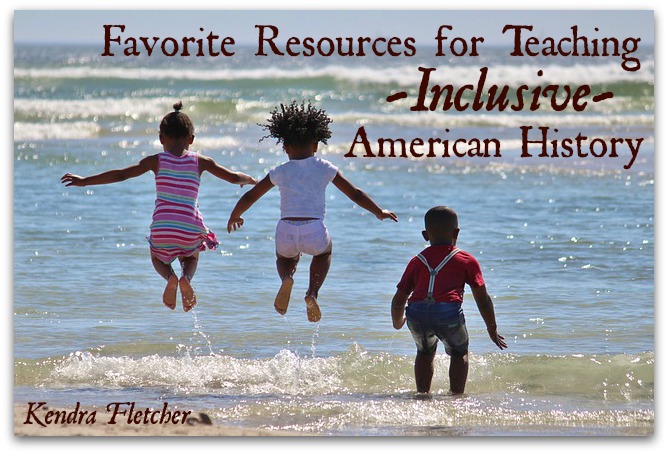Why We Must Teach Inclusive History - Belinda Bullard
I met Belinda Bullard at the 2:1 Conference in April and so appreciated hearing her heart about inclusive curriculum. Actually, the truth is that I didn't shut up. I talked Belinda's ear off about how important I think it is to make our kids aware of the plight of others. Poor Belinda :p
Here in the heart of California's agricultural land, we see so many nationalities represented, and often these are the people leading the hardest of lives. In our valley it tends to be Mexicans, Laotians, Hmongs, and Vietnamese, and I want my kids to understand that they are to be respected and encouraged because so many have had such horrifying journies to be where they are: in America, with a job, and a regular meal.
Belinda has authored a curriculum series that focuses on the history of African-Americans, but don't count it out of you aren't of African descent. We have much to learn about the story God is weaving in the lives of others, and as Belinda says, it's HIS story!
By the time that you read this article, we will have concluded the month of February, also known to many as Black History Month. In March, we celebrated Women’s History Month, and in the fall, we will celebrate Hispanic Heritage Month.
As an African-American writer, I appreciate the intent of each of these celebrations; we use the time to highlight the history of those contributions that arguably are not acknowledged in our traditional study of history. Emphasizing these histories and others is a step toward our increased awareness, appreciation, and shared enthusiasm regarding all the contributions made by many in shaping our great nation. Yet, I cannot help but think that the message underneath these celebrations is a bit disturbing: is this the only time we highlight history that is not defined in a textbook (even a homeschool text, dare I say) as American history? Where do these stories and contributions find themselves during the remainder of the year?
Answering these questions requires that we first address a more basic question: what does a “good” study of history entail? The Bradley Commission on History in Schools pondered the same question. This Commission was birthed in 1987 to address how, when, and how much history is taught in American classrooms. From the website of Designed Instruction, ‘The group was comprised of 16 of the most respected members of the history profession, including former presidents of each of the major professional organizations in history and a number of award-winning history teachers and writers.’ (2012) What was the consensus of this group of academicians?
A solid history study should allow, among other items, the following:
- An understanding of the significance of the past to the student’s present
- A perception of past events and issues as they were experienced by people at the time, to develop historical empathy as opposed to present-mindedness
- A comprehension of diverse cultures and of shared humanity
- An understanding of the importance of human intentions, but also the consequences shaped by how those intentions are carried out, in a tangle of purpose and process
- A recognition of the importance of individuals who have made a difference and the significance of personal character for both good and ill will
Inspiring, right? If we just embraced these few purposes regarding what history should generate in the hearts and minds of those who study it, it becomes clear to us why inclusive history is worth studying year-round. Simply stated, all history—Black history, women’s history, and other histories—must be a part of our school rooms for more than one month.
All history is God’s story, and inclusive history makes it clearer how we are all grafted into God’s kingdom.
There are other reasons that inclusive history is important. All history is God’s story, and inclusive history makes it clearer how we are all grafted into God’s kingdom. Regardless of how our story is weaved into the fabric of American history, we are a part of God’s overall plan. Consider, as an example, this poetic rewrite of Romans 8:28 by Phyllis Wheatley, the first African-American poet to be published:
On being brought from Africa to America.
'Twas mercy brought me from my Pagan land,
Taught my benighted soul to understand
That there's a God, that there's a Saviour too:
Once I redemption neither fought now knew,
Come view our sable race with scornful eye,
"Their colour is a diabolic die."
Remember, Christians, Negroes, black as Cain,
May be refin'd, and join th' angelic train.
Inclusive history builds citizens who are fully engaged in their future with an intelligent eye for the past. I would sorely understate the world we live in by saying that we are becoming a more global society. In truth, we are already there, never to return. Yet, how well our children engage amidst this societal reality is dependent upon them understanding their place in the world, then and now. The history books that we grew up with are, at minimum, outdated; in the worst cases, they contain racist and sexist stereotypes that do not serve us well, and that mentally impair our children and grandchildren. Incorporating the history of someone who does not look like us gives perspective. It heightens sensitivity and affords our children the ability to sense emotion at the time that it happened—that historical empathy that the Bradley Commission articulated as critical.
Limiting our perspective on historical events limits us.
As a final thought, limiting our perspective on historical events limits us. As runaway slave, human rights leader and lecturer Frederick Douglass declared, ‘No man can put a chain about the ankle of his fellow man without at last finding the other end fastened about his own neck.‘ More recently, two African-American football coaches competed against one another at the culmination of the 2006 NFL season as the Indianapolis Colts defeated the Chicago Bears in the Superbowl. When Tony Dungy, the winning coach, was asked prior to the game about the impact of a scarcity of African-Americans amongst management ranks in professional football, he spoke to how stereotypes hinder a much larger group than the intended recipient of the stereotype’s fallout. The traditional image of a professional football coach, Dungy stated, also excluded young men like Jon Gruden or Mike Tomlin—both championship coaches as well (Tomlin was the 2nd African-American coach to win a Superbowl).
How might your children’s eyes be opened, for instance, by studying early American history from the perspective of the native American? Also, did their contribution to history end after the Revolutionary War or the Trail of Tears? I bet the Navajo Code Talkers would not think so. I could go on, but just think about it: are your history studies a stepping stone or a stumbling block?
~Belinda

Belinda Bullard has written an American history curriculum and related products that feature the African-American presence in building this great nation.
Visit her site at Blessed Heritage. If you’d care to link with Belinda elsewhere, she also contributes regularly to the Home Educating Family blog, Heart of the Matter, and Women Walking with Jesus as a writer, and less regularly to Home Educating Family Magazine. Feel free to join her over at the Homeschool Lounge, or to follow her on Twitter.
Hear Belinda Bullard give a compelling interview with HomeschoolingIRL on why more African American parents are choosing to homeschool their children.







